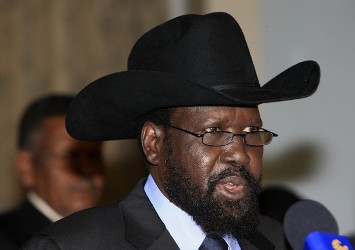South Sudan’s Kiir forms austerity committee as oil row continues
February 23, 2012 (JUBA) – South Sudan’s president Salva Kiir Mayardit has appointed a fifteen member committee to decide on the austerity measures needed to keep the nascent government functioning after loosing 98% of its income through the loss of oil revenues.

However, since South Sudan seceded, the two sides have been able to come to agreement on a host of issues including border, the contested territory of Abyei, international debt, trade and citizenship for ethnically southern Sudanese remaining north of the new international border.
Considering their public negotiating positions Juba and Khartoum are miles apart. South Sudan says that according to international norms it should pay less than $1 for each barrel exported through the north and arguing that Sudan’s demand for $36 is unjustified.
Khartoum claims it is owed over $1 billion in unpaid fees and had begun siphoning off oil from South Sudan and impounding shipments of southern crude before it could leave Port Sudan, when Juba took the unexpected move of shutting down production altogether.
South Sudan denies it has not been paying fees and accuses its northern neighbour of “looting” some 6 million barrels, worth around $815 million.
However, South Sudan’s decision has been described as economic suicide by north Sudan and some analysts. The country is one of the poorest in world and is struggling address insecurity, tackle corruption, provide public services and respond to humanitarian emergencies within its borders.
The new austerity committee will be chaired by South Sudan’s minister of finance, Kosti Manibe, the president announced on Wednesday in a presidential decree.
Earlier this week Manive announced South Sudan was cutting in half all non-salary government spending with immediate effect.
Kiir also appointed Emmanuel LoWilla, a minister in the office of the president as secretary general of the committee.
Other members include:
- Alison Magaya- Interior Minister
- Garang Diing Akuong – Trade and Investment Minister
- Majak D’ Agoot – Deputy Defence Minister
- Oyai Deng Ajak – National Security Minister
- Stephen Dhieu Dau – Oil Minister
The austerity measures already approved by South Sudan’s cabinet on Monday will not effect salaries among the civil service or the security services, the finance minister has said. will be effective upon signing by the President.
“The cutbacks are effective immediately and will ensure that the necessary funds are available for the continued operation of the government and security forces,” the finance ministry said in a statement.
The presence of the ministers of interior and national security, as well as the deputy minister of defence, is perhaps significant as it is South Sudan’s security organs that are least likely to experience severe cuts.
South Sudan has a tense border with North Sudan, with officials from both sides accusing the other of bringing the two sides closer to return to war. Juba and Khartoum regularly trade accusations of arming and supporting rebel groups fighting their military.
Conflict in Jonglei State between well armed cattle herding groups, as well as insecurity on the border of Warrap, Unity and Lakes have all put strain on South Sudan’s police and army (SPLA), which until only seven years ago was a guerrilla movement.
South Sudan’s ruling SPLM was the political face of the SPLA – now the official South Sudanese military – during the two-decade civil war.
The decree also appointed representatives from Eastern Equatoria and Northern Bahr el Ghazal States.
Four state governors were also placed on the committee:
- Unity State Governor – Taban Deng Gai
- Jonglei Governor – Kuol Manyang Juuk
- Central Equatoria State Governor – Clement Wani Konga
- Upper Nile State – Governor Simon Kun Puoc
Kom Kom Geng, a chairperson of the public account committee, is also among the presidential appointees.
The committee is tasked with assisting the Ministry of Finance and Economic planning to determine what parts of government spending will be reduced. This will include establishing monthly operating and capital limits for ministries.
Functions of the government deemed non-essential by the committee will be cut or temporarily shut down.
(ST)
